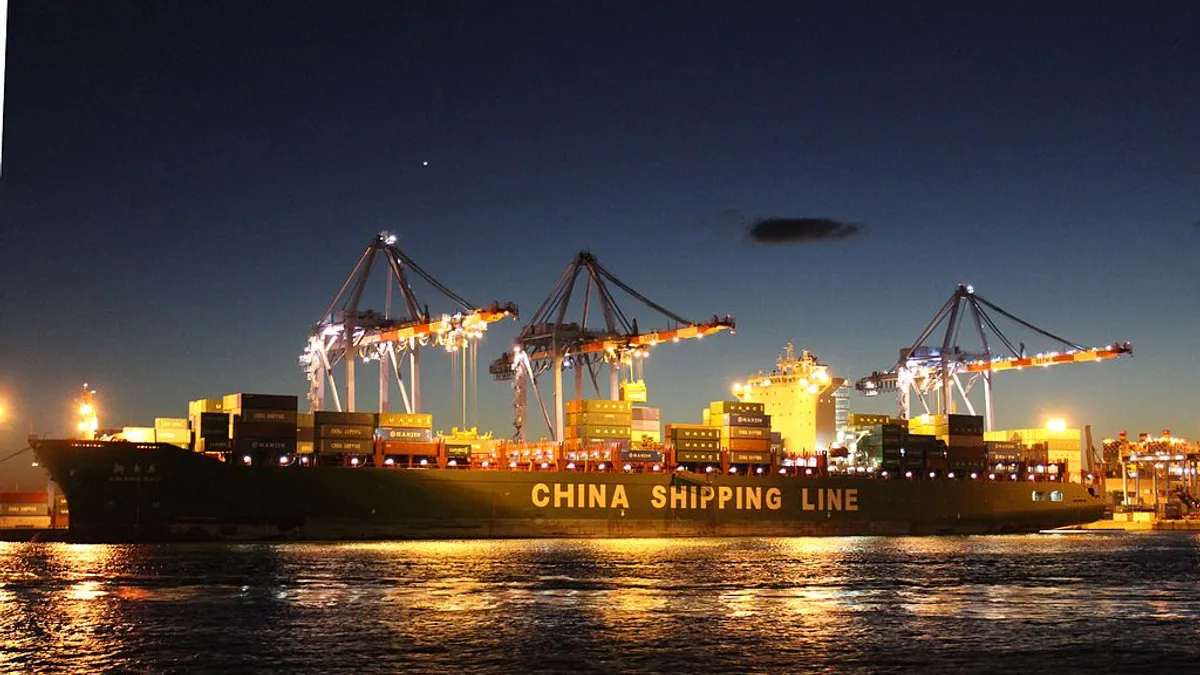Dive Brief:
- The purchase of Orient Overseas Container Lines' parent company by China's COSCO Shipping took the last feasible takeover candidate off the market, according to Drewry Shipping Consultants. Any further acquisition may have trouble securing regulatory approvals over market share concerns.
- The latest deal caps a second wave of consolidation that will lead the top seven ocean carriers to control more than 75% of market share by 2021. A dozen years ago, before the first wave of industry consolidation, the top seven ocean carriers controlled only 37% of total capacity.
- Such industry "oligopolisation" will "reduce shippers' options and raise freight rates," according to the consultants. "It is the unfortunate price to be paid for years of non-compensatory freight rates that have driven carriers to seek safety in numbers, either through bigger alliances and/or M&A."
Dive Insight:
The COSCO-OOCL deal is a monumental step in the consolidation in the shipping industry, and how it unfolds will speak more to the forces at play in the global markets than is first evident. At least, so much has been revealed by the myriad analysts spinning their words in the days after the announcement.
Drewry's comments highlight three, pivotal aspects of the deal to which shippers should pay attention. First, COSCO's entry into the North American market is a significant step for the major line, and threatens to alter the carriers of choice. Second, OOCL's reputation as a high-profit, reliable shipping line may help the merged company raise the standard for customer service. Third, while more options and better service in the U.S. market adds value for shippers, a consolidated global market is also likely to raise rates in the long-run.
However, Drewry also raises some key questions on all analysts' minds: Will the deal succeed, and if so, what's next? In a blog post for Shipping Today, Olaf Merk suggests geopolitics may be more at play than concerns over competition based on recent events in the shipping industry.
A few examples support his claim. The Wall Street Journal previously reported OOCL did not want to sell, but was pressured into doing so by the Chinese state. Hanjin Shipping's bankruptcy was partly due to Korea's unwillingness to bail the shipping line out, instead betting on Hyundai Merchant Marine as its preferred carrier. And, as much as the triple-merger between Japan's container lines makes competitive sense, it also has a nationalist undertone. In fact, Merk recalls the European Union and the U.S. once approved a mega-alliance between Maersk, Mediterranean Shipping Co. (MSC) and CMA CGM, which was later denied by China.
Drewry says the COSCO-OOCL is likely the last of its kind as any other acquisition would pick up too large a market share to be competitively viable. Regulators worldwide appear to be concerned over collusion in the shipping industry, and have placed numerous conditions on much smaller deals before their approval.
But, if as Merk suggests, geopolitics prevail over regulators' minds, a third wave of consolidation may still be on its way. Much of it depends on the regulatory decisions undertaken over the next year, particularly over the recent deals in Asia.















